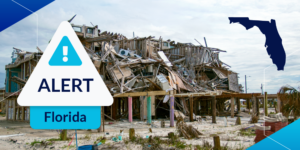
Florida property insurance company Avatar was ordered into liquidation last month — making it the second property insurer in Florida to go under this year after Saint John’s Insurance Company folded in February. And with hurricane season approaching, Florida restoration contractors should be prepared in the event of more insurance company failures, which could lead to project delays and payment disputes.
Avatar’s liquidation marks the sixth insurance company to be sent to receivership since 2017, and another six are currently reported to be on the brink of failure. Avatar policyholders were told their policies would end on April 13, and that they would need to find a new insurance policy with another company.
Florida homeowners have had difficulty with insurance companies in recent years: Agents are reporting multiple calls a day from homeowners who have had their policies canceled. Major hurricane damage claims and ballooning construction costs have led insurance companies to become more selective about issuing policies, and property owners have had difficulty finding new providers.
Rising premiums, canceled policies, and a declining number of welcoming insurance companies could spell bad news for restoration contractors. Homeowners may think twice about filing a claim for restoration work if it means their premiums might skyrocket — and that’s only if they still have a policy that will even cover the work.
This could mean that there will be less restoration work available for contractors if the insurance market continues to be stretched thin. For contractors who do manage to find work, an insurance company’s failure can make things complicated.
Restoration and repair contractors face unique payment challenges
Contractors who specialize in restoration and repair work face unique payment challenges. Though a project’s contract may be with the property owner, contractors will generally only be paid once the insurance claim is paid out.
In the event of an insurer’s liquidation, it becomes considerably harder for a restoration contractor who is mid-project to get paid when the property owner has their insurance policy canceled.
Related: Can a Property Owner File a Claim Against the Contractor’s Insurance?
For instance, Avatar’s website, which claims its accounts with Bank of America have been frozen, says the insurer will not reimburse contractors who are owed money for services provided before the liquidation. Claims will be considered against the estate, and contractors will need to submit a Proof of Claim form to the designated receiver.
Fortunately, a contractor’s lien rights will continue through insurance complications.
“For contractors, lien rights will generally still be available for the value of labor and materials already provided,” said Alex Benarroche, construction attorney and legal Associate at Levelset. “How the project will proceed from that point will likely be determined by the terms of the contract in this scenario.”
“The Florida Insurance Guaranty Association (FIGA) is the state body that handles unresolved claims when insurance companies go insolvent, and the homeowner will eventually file a claim with them,” continued Benarroche.
According to FIGA’s website, the association will generally cover up to $300,000 per claim for Avatar customers, and an additional $200,000 for structures and contents on homeowners’ claims.
This isn’t an ideal situation, but luckily for restoration contractors, a mechanics lien will provide simply the best way to secure the right to payment, regardless of who ends up paying for the work.
No end in sight for Florida’s property insurance crisis
With the strongest hurricanes able to cause flooding 25 feet above normal water levels, every hurricane season brings the risk of significant damage and injury to a large number of US states — Florida being chief among them. As weather patterns grow more volatile, it’s unlikely that the coming decades will provide any relief.
Four of the six most costly hurricanes on record have occurred in the last five years. In 2017 alone, hurricanes Harvey, Maria, and Irma battered much of the Caribbean and Southeastern US and caused a combined $304 billion in damage.
With this in mind, it’s no wonder why Florida’s property insurance companies are struggling to compete. Florida homeowners have seen their insurance premiums double without even making a claim, and have had their policies canceled while fatigued insurers make a mass exodus from the Sunshine State.
Florida Governor Ron DeSantis plans to hold a special session in the coming weeks to discuss the evolving property insurance crisis in the state, but it’s not clear what the solution will be.
In an industry already pressured by financial issues — 97% of surveyed construction professionals report experiencing stress from cash flow and payment-related problems — insurance disputes are the last thing contractors need.
It’s important for contractors to do what they can to protect cash flows and secure the right to payment. For restoration contractors in Florida, a mechanics lien can be a valuable tool in the event a project owner’s insurance policy is canceled. A mechanics lien places a claim on the property, and will put pressure on the owner to find an insurer that will cover your services.
